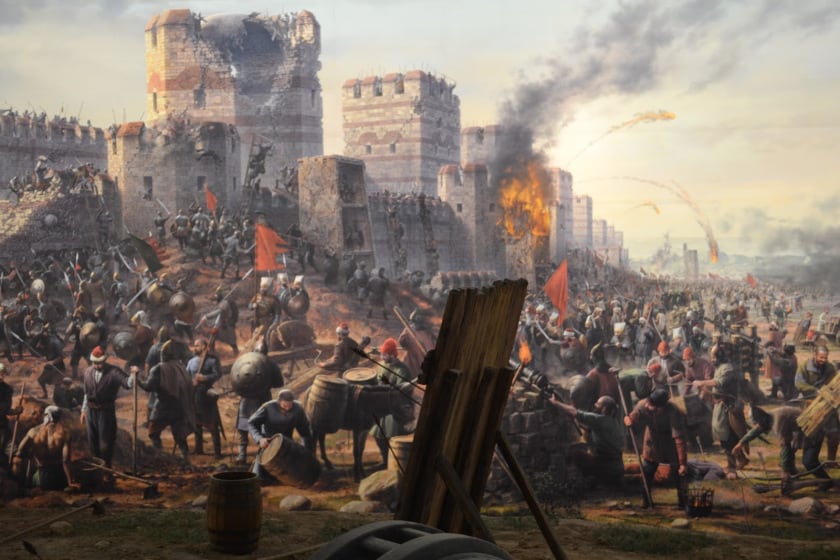Imam Malik was a Tabi’ at-Tabi‘i (a Muslim of the 3rd Generation). He lived his whole life in Madinah, the City of the Prophet (SAW), during the transition period between the Umayyad and Abbasid Khilafah.
He was the second of the four major mujtahid Imams, and being born and living in Madinah he witnessed first-hand the traces and actions of the Companions and Followers.
Life
Imam Malik grew up in a household which was engaged in the science of traditions and hadith. He first studied under his grandfather (a great Tabi’) and memorised the Qur’an. He also spent at least 7 years with the scholar ibn Hurmuz and from an early age sat in the circles of prominent jurists and memorised many ahadith with their transmission chains. He eventually took a post in the Prophet’s (SAW) mosque as a faqih (jurist) and teacher of ahadith when he was thoroughly versed in all Islamic disciplines. He held great respect for the ahadith, so much so that he would ensure he had performed wudu, applied perfume and worn clean garments when transmitting hadith, yet would not necessarily do so when giving his own fatwas. He confined himself to two areas of knowledge: Hadith and Fiqh.
Fataawa
Imam Malik gave fataawa in a prudent manner and disliked having them written down. In fact, he often hesitated in giving fataawa, famously answering with “I do not know” at times, unless he could thoroughly substantiate his rulings based on the Qur’an and Sunnah. Imam Malik once remarked, “‘I don’t know’ is a third of all knowledge, and one who does not know to say it, does not know anything”.
He would never give a fatwah on hypothetical situations as he feared people would then exercise wrong methods.
His approach of thinking before speaking was to form only the correct ruling, or from another angle out of fear of spreading incorrect teachings by being hasty, even though it would be highly unlikely for him to have erred.
Knowledge
Imam Malik sought knowledge in four areas which are essential in the formation of the complete scholar and faqih who knows the sources properly, who is able to derive rulings from them correctly, who has true understanding of current reality, and has the ability to disseminate knowledge among people.
The main areas Imam Malik directly focussed on included the Ahadith of the Messenger (SAW), the fataawa of the Companions as well as the study of deviant sects. Imam Malik is well known for founding the Maliki madhab (school of jurisprudential thought), but probably more so for compiling his magnum opus, the Muwatta, a collection of Sunnah/Ahadith, Athar of the Sahaba and some of his own commentary on the content- a book that was rated as being the most authentic after the Qur’an by equally great Imam Shafi’i, who was his student for some time.
The Muwatta at one stage contained 10,000 hadiths. However, by the end it contained only 1700. Imam Malik feared including other than what was from the Prophet (SAW) and employed a vigorous editorial regime whereby he deleted many reports yearly, so much so that his contemporary, Atiq al-Zubayri, feared none of it would remain.
According to Shah Waliullah, the book is a collection of the most authentic Ahadith of the Prophet (SAW) selected by Imam Malik after thorough examination of their sources. The reliability of the reports and reporters was to him of paramount importance and he took great pains to ensure that no incorrect report should find place in his book. Imam Malik said: “I showed my book to seventy jurists of Madina, and every single one of them approved me for it, so I named it ‘The Approved’ [al-Mu’watta’]”.
Imam Malik was born into a wealthy family and did not need to necessarily work to earn a living. This gave him further opportunity, at least time-wise, to pursue knowledge. However he was not given to monasticism – indeed Ibn al-Qasim (one of his students) reported that Imam Malik had 400 gold dinars as working capital which he used to trade with. It is also probable that he partnered in cloth trading with his older brother al-Nadr. This is not to indicate that he was overly concerned with worldly matters, rather Imam Malik is a fine example of an upright Muslim who Islamically balanced his life. Indeed he put Islam before his personal comfort, one time dismantling his roof and selling the wood to finance his education.
He also regarded accepting gifts from the khulafaa’ (but not from any other government official) permissible for scholars; but this never meant that he compromised his scholarly work. He spoke the truth and remained steadfast in adhering to the deen of Allah (SWT).
Activities
Imam Malik was thoroughly active in his duties. He lived a life of categorical adherence to Islam and wanted the same for the community. His engagement in the community was essentially two fold: one involving teaching the people generally and giving legal opinions (fatwas) on real-life issues and the other to establish order in the community by exerting his influence.
Imam Malik saw the exchange of leadership from the Umayyad Khilafah to the Abbasid Khilafah, the revolt of the Kharajites (who were violent and withdrew allegiance to the Khalifah) and ‘Alawites (another deviant group). He also heard of accounts of the revolt of Ibn az-Zubayr against the Umayyad Khilafah when the sacredness of the two Harams was violated.
Imam Malik took the correct Islamic position of not rebelling against the Khalifah, nor abandoning the allegiance to him, nor being content with the improper rule. Instead he sought to reform the Khalifah through proper means. He established this position upon ahadith and not mere neutrality.
Imam Malik once taught the athar, “The word of divorce proclaimed under duress is not divorce, and she is not haram for you, so return to your home” (Muwatta 29.28.78) which was built upon a hadith. Those that were partaking in the rebellion against the then Khalifah al-Mansur took the principle from this athar, being oaths made under duress are invalid, to trumpet “scholarly support” for their rebellion (i.e. – withdrawal of allegiance and subsequent hostility). As the un-Islamic rebellion against the Khalifah was in motion, al-Mansur practically forbade Imam Malik to teach this athar whereas the rebels encouraged him to teach it. Imam Malik would regularly advise the governors and rulers, for he feared that they would be inconsistent in the application of Islam. Imam Malik, unaware of the motivations of the rebels, hence disregarded the Khalifah’s request and fearing none but Allah (SWT), continued his traditional way of being a muhaddith and faqih. This meant he continued to teach and did not censor the hadith.
The governor of Medina, who was officially appointed by the Khalifah, had Imam Malik whipped severely to the point that his shoulders became dislocated. Yet he did not change his stance over the hadith.
When the Khalifah al-Mansur later met Imam Malik during Hajj, he sincerely apologised to him, vowed to punish the governor for the outrage, asked the Imam to come and meet him in person and offered the Imam residence in Baghdad. The Imam accepted the apology but refused to go to the Khalifah’s court and the free residence. He asked that al-Mansur should rather come and visit him in Medina.
Standing Firm
Imam Malik also stood firm in the face of “Islamic” rulings based on un-Islamic sources. He adopted correctly that the Qur’an is the word of Allah (SWT), that it is part of His (SWT) essence and is not created, against the tide of the false “logical” understanding that the Qur’an is created. This incorrect belief was gaining such momentum amongst some scholars during his lifetime that eventually some Abbasid Khulafaa, years after his death, officially adopted this position and punished scholars who held the correct view, as Imam Malik himself did.
The amount of respect and honour built up around the works of Imam Malik is due to the inimitable character and piety he possessed. Throughout his life, the number one priority for himself was the deen of Allah as he carried it on his shoulders until the day he died at 86 years of age.
What is clear from such a brief look into Imam Malik’s life is that he was most concerned about the complete implementation of Islam and not allowing foreign teachings and ideas contrary to Islam to mix with Islam itself, either in theory or practice. This is a great lesson for Muslims of any era, and especially for the Ummah today.
![]()










![Imam Malik – Proof of the Community [Biography]](https://www.hizb-australia.org/wp-content/uploads/2016/05/Silhouette-Of-Man-Praying-At-Sunset-shutterstock-800x430.jpg)




